A Closer Look at How NHTD Fosters Independence and Well-Being
The NHTD Waiver Program stands as a vital Medicaid initiative dedicated to supporting seniors and individuals with disabilities in maintaining their independence and enhancing their quality of life. By offering personalized, community-based services, it provides a powerful alternative to institutional care, focusing on empowering individuals to live in their preferred environments. This narrative explores the program’s functions, benefits, features, and the robust outcomes it fosters, demonstrating its role in transforming lives across New York State.
Understanding the NHTD Waiver Program and Its Core Goals
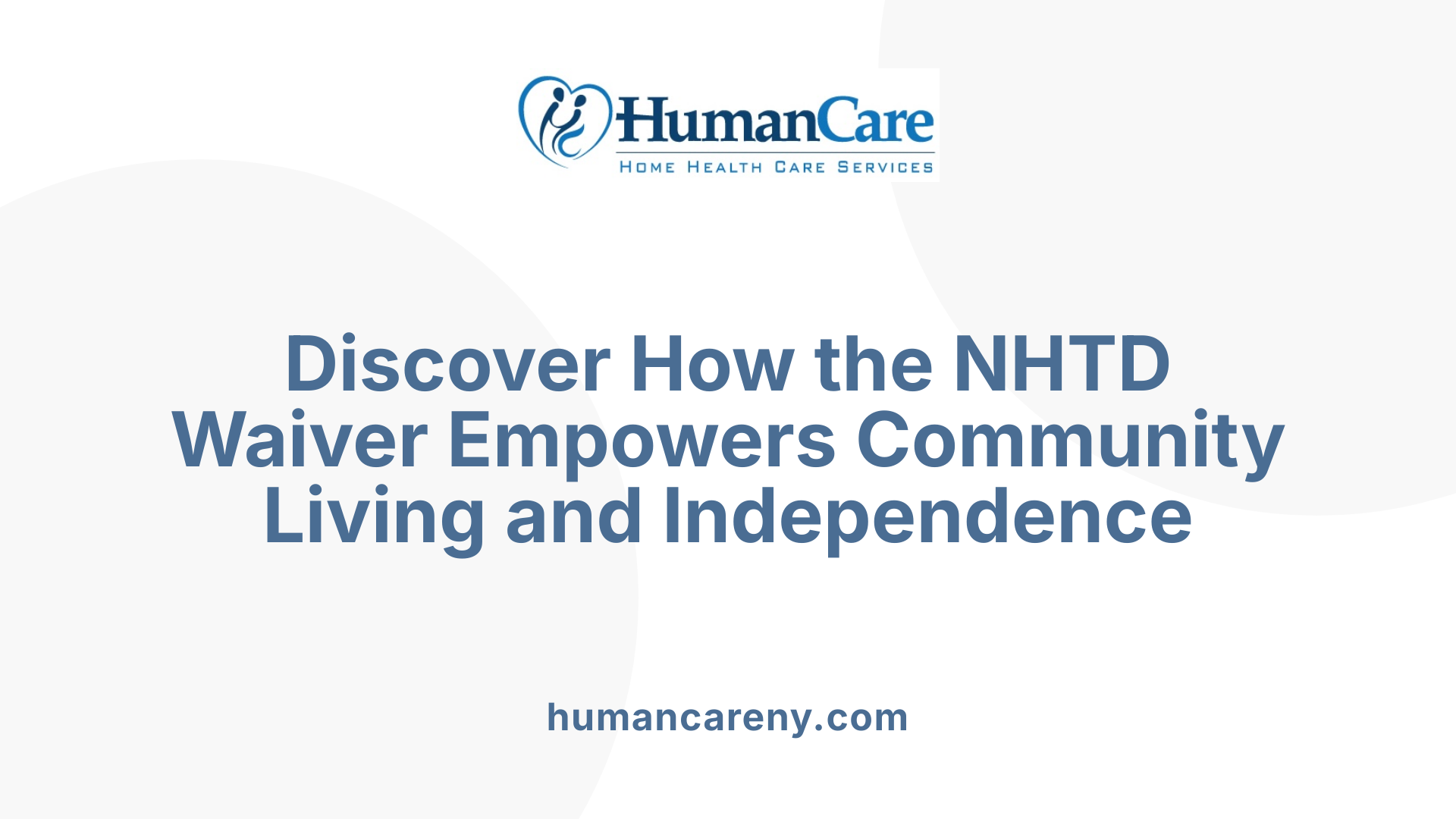
How does the NHTD Waiver Program function, and what are its core purposes?
The NHTD Waiver Program is a Medicaid-funded initiative aimed at helping seniors and adults with disabilities stay in their own homes or community settings instead of moving to nursing homes or other institutional facilities. Managed by the New York State Department of Health, along with regional resource centers, this program offers a personalized suite of services tailored to individual needs.
Participants undergo an application process that starts with a detailed assessment of their health status and living environment. A case manager then collaborates with the participant to develop a personalized Service Plan. This plan includes essential supports such as assistive devices, environmental modifications like installing grab bars, personal care, therapy, and other supports that enable independence.
The core purpose of the program is to provide a robust alternative to institutional care. It helps reduce unnecessary nursing home placements by offering services that promote safety, independence, and community engagement. Moreover, it aims to improve quality of life through person-centered care, addressing individual preferences and needs.
This program not only supports daily living activities but also focuses on empowering individuals to manage their health and well-being, enabling them to live more independently within their communities. Ongoing coordination ensures that services adapt to changing needs, preventing hospitalization and institutionalization whenever possible.
Program Overview and Service Delivery Model
| Aspect | Description | Additional Details |
|---|---|---|
| Management | Managed by NYS Department of Health and regional centers | Ensures statewide oversight and regional adaptation |
| Eligibility | Medicaid-eligible individuals, age 18+ or seniors | Focuses on those needing nursing home level of care |
| Services Offered | Personal care, therapy, assistive technology, home modifications | Customized to address individual needs |
| Application Process | Assessment, Service Plan, ongoing care coordination | Facilitates tailored support |
| Core Goals | Prevent institutionalization, promote independence, enhance quality of life | Supports community living |
Integrating Personalized Supports to Keep People in Community
The NHTD Waiver Program emphasizes a person-centric approach by customizing services to what each individual needs most. This includes various aids to help with activities like bathing, dressing, and medication management. Assistive technology and home modifications are common features that support safety and functional independence.
Care plans are designed collaboratively, ensuring people have a say in their care. Regular reviews and coordination help keep services aligned with personal goals, assisting with social activities, and minimizing feelings of isolation.
In summary, the NHTD Waiver Program serves as a vital bridge for eligible individuals to remain active participants in their communities. It reduces reliance on traditional institutional care by providing accessible, tailored support that enhances independence and well-being.
The profound benefits of NHTD for community-dwelling seniors and disabled individuals
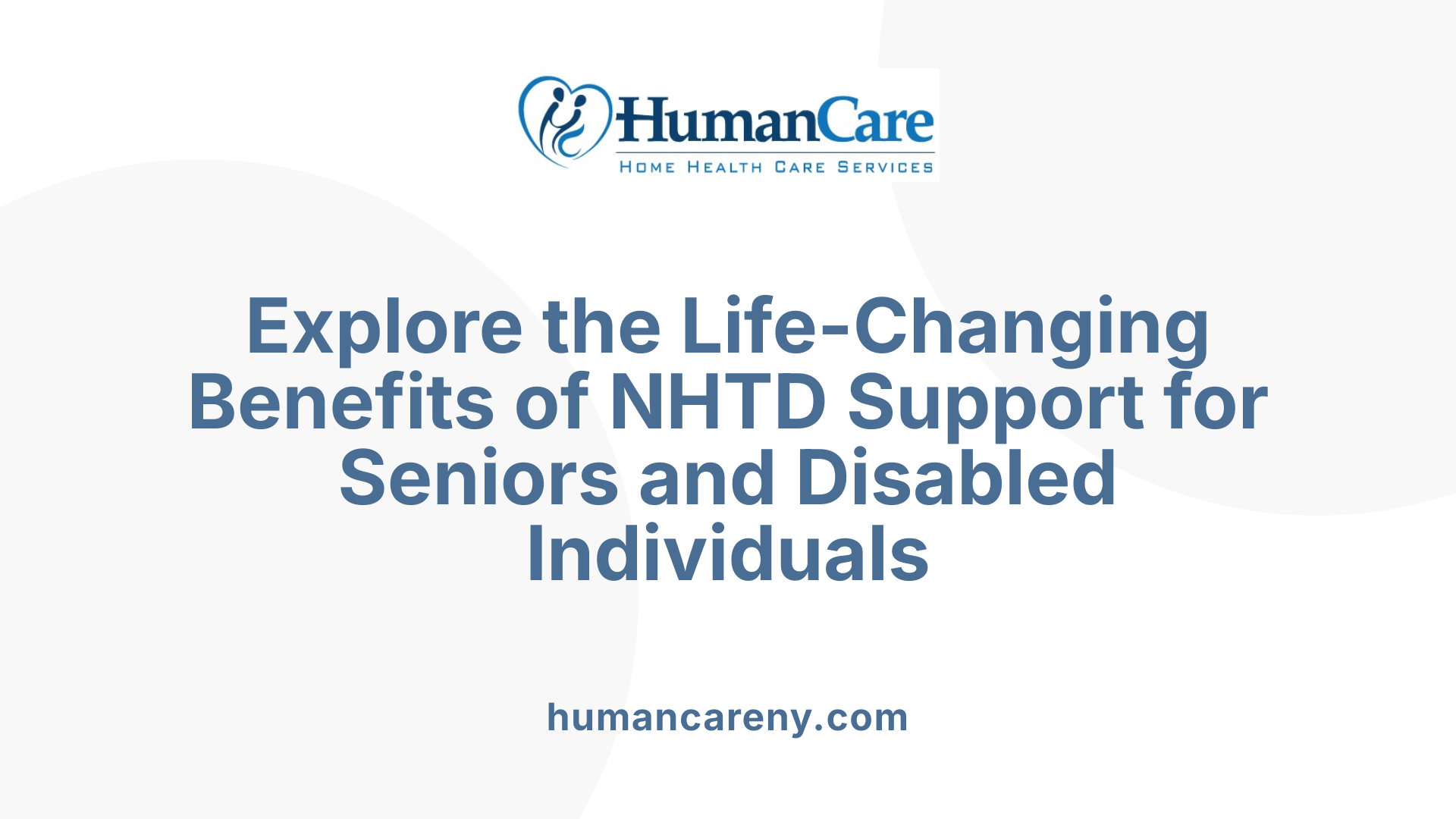
Promotes independence and self-sufficiency
The NHTD Waiver Program is designed to help seniors and individuals with disabilities live more autonomous lives in their own homes. By emphasizing a person-centered approach, the program tailors services to meet individual needs and preferences. Participants are encouraged to take an active role in their care, fostering independence and confidence. Services like service coordination, personal care, and therapy assist participants in managing daily routines effectively. Additionally, home modifications such as grab bars and non-slip mats improve safety and accessibility, reducing reliance on institutional care.
Provides essential services like home care and assistive devices
Participants in the NHTD Program have access to a broad range of supports that enhance their quality of life. Home care services include assistance with activities of daily living (ADLs) such as bathing, dressing, and meal preparation. The program also supplies assistive technology and devices, for example, mobility aids and communication tools, which help individuals perform daily tasks more easily. Environmental modifications are customized to address specific safety concerns and facilitate easier navigation within the home.
Supports social inclusion and community engagement
Beyond health and safety, the NHTD Program encourages social interaction and community participation. Through organized activities, outings, and communication support, participants can connect with friends, neighbors, and community resources. This social engagement is vital for mental and emotional well-being, helping to prevent feelings of isolation and depression.
What benefits does the NHTD Program offer to seniors and disabled individuals?
The NHTD Program offers numerous advantages by supporting the ability to stay in their communities instead of moving into nursing homes. Benefits include personalized, goal-oriented care plans that resonate with individual lifestyles. Access to home care, assistive devices, and modifications enhances safety and independence. The program fosters a sense of empowerment, control over personal choices, and participation in community activities. Moreover, it contributes to better health outcomes through regular monitoring and support, all while respecting the rights and preferences of each participant.
Additional support through comprehensive services
In addition to direct health supports, the program provides service coordination to help participants navigate service options and develop personalized plans. Other services like structured day programs, counseling, and community transition support help individuals maintain routines and foster a sense of belonging.
Table: Services and Benefits Overview
| Service Type | Benefits Offered | Details |
|---|---|---|
| Personal Care | Daily activity management | Assistance with bathing, dressing, grooming |
| Assistive Devices | Increased mobility and independence | Wheelchairs, communication aids |
| Home Modifications | Safer living environment | Grab bars, ramps, improved lighting |
| Therapy | Enhanced health outcomes | Physical, occupational, or speech therapy |
| Social Support | Reduced isolation | Community outings, organized activities |
| Care Coordination | Streamlined services | Individualized care planning |
The NHTD program underscores a commitment to helping seniors and disabled individuals maintain their independence, stay socially connected, and enjoy a higher quality of life within their own communities. By offering personalized, comprehensive support, it ensures participants can live with dignity while actively engaging in everyday life.
Enhancing quality of life through tailored supports and services
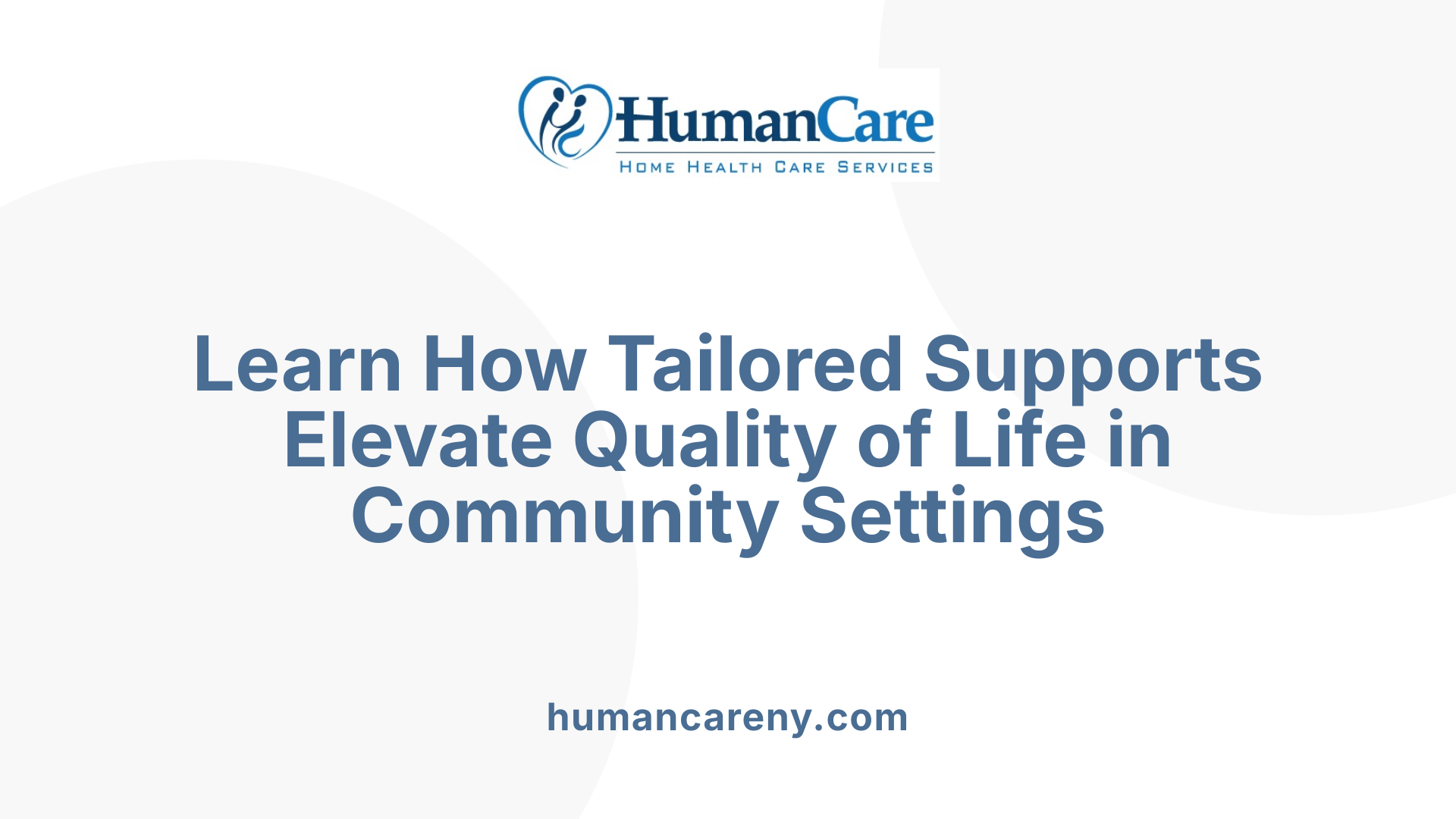
How does participation in the NHTD program improve the quality of life for individuals?
Participation in the NHTD (Nathaniel H. Fields Disability) Waiver Program significantly enhances the lives of individuals with disabilities and seniors by providing comprehensive, personalized support that promotes independence and community involvement. The program offers a wide array of services such as personal care, therapy, assistive technology, and home modifications, all designed to address individual needs and foster a person-centered approach.
One of the fundamental ways the NHTD program boosts quality of life is by enabling participants to live safely and comfortably in their homes, reducing reliance on institutional care like nursing homes. By tailoring services to each person's unique circumstances, the program promotes meaningful daily activities, supports social connections, and enhances mental well-being.
The holistic, assessment-based model ensures that each care plan accounts for physical, social, and emotional aspects of well-being. This personalized planning helps individuals better manage their health conditions, maintain their routines, and adapt to changing needs, which collectively contribute to a higher quality of life.
Incorporating early detection and chronic condition management also plays a crucial role. The program emphasizes proactive health monitoring and timely interventions, such as HIV testing and treatment, which prevent complications and support ongoing health. This focus on early diagnosis and management helps sustain better health outcomes, allowing participants to stay active and engaged longer.
The program recognizes the importance of caregivers and relationships, providing support and education to reduce caregiver burden. When caregivers are well-supported, they can provide more effective assistance, which reduces functional limitations and enhances emotional bonds, further improving participants’ overall well-being.
Additionally, community engagement opportunities facilitated through the program help reduce social isolation. Organized activities, community outings, and communication support foster social inclusion, which is vital for emotional health and life satisfaction.
Overall, the NHTD program creates a supportive environment that addresses the complex needs of individuals, integrating medical care, social support, emotional well-being, and independence. This comprehensive approach ensures that participants can enjoy a higher quality of life—living in their preferred environment, maintaining their dignity, and participating actively in their communities.
| Support Type | Services Provided | Impact on Quality of Life |
|---|---|---|
| Medical & Personal Care | Therapy, medication management, personal assistance | Improved health, safety, and independence |
| Home Modifications | Grab bars, non-slip mats, assistive devices | Safer, more navigable living spaces |
| Social & Community Activities | Community outings, organized activities | Reduced isolation, increased social engagement |
| Caregiver Support | Education, respite services | Better caregiver and participant well-being |
| Health Monitoring | Early detection, chronic condition management | Prevention of complications, sustained health |
By blending these supports, the NHTD program helps individuals maintain a meaningful, active, and independent lifestyle, which is fundamental for overall well-being and life satisfaction.
Eligibility criteria and the application pathway
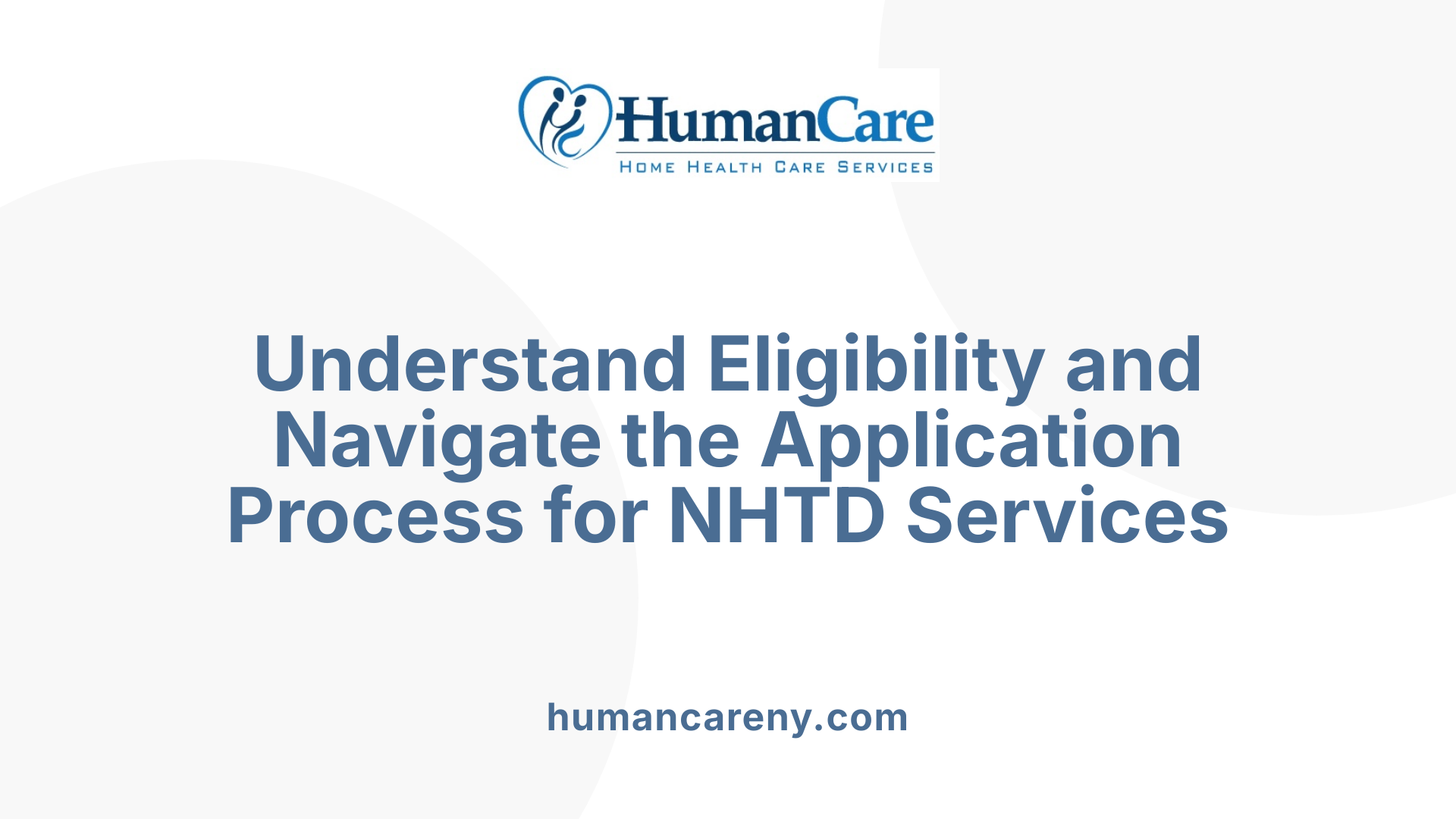
What are the eligibility criteria and application processes for NHTD services?
The NHTD Waiver Program aims to support individuals with disabilities or aging adults to live independently in their communities. To qualify, applicants must meet specific Medicaid and residency requirements.
Eligible individuals include those who are residents of New York State, actively receiving Medicaid, aged 18 or older with a physical disability, or 65 years and older. Applicants must demonstrate that they require a level of care usually provided in a nursing home, which is assessed through standardized evaluations.
The documentation process involves providing evidence of disabilities—such as Social Security Awards, medical reports, or assessments—and undergoing functional assessments like the Hospital and Community Patient Review Instrument and SCREEN. These help determine if the individual can safely live outside an institutional setting.
The application process is multi-step:
- Initial Intake and Assessment: Applicants contact their Regional Resource Development Center to begin the process. During this phase, they submit documentation and participate in assessments to determine eligibility.
- Development of Service Plan: Based on the assessment, a personalized service plan is created. This plan details the services needed to support community living, including personal care, therapy, assistive technology, and home modifications.
- Submission of Supporting Documents: Applicants must submit a Plan for Protective Oversight or be represented by a legal guardian. They also sign a Freedom of Choice form to specify their preferred providers and living arrangements.
Once the documentation is complete, the review team assesses the application, ensuring it meets all criteria. They consider factors such as cost neutrality and individual safety. Upon approval, services are authorized, and participants can begin receiving care in their homes or community settings.
This structured process ensures each individual’s needs are carefully evaluated, promoting safe, personalized, and effective support plans that help prevent unnecessary institutionalization and foster independence.
For more detailed information, individuals can search for "NHTD application process and eligibility criteria" to access official guidelines and assistance programs.
Scope of services: What the NHTD Waiver offers
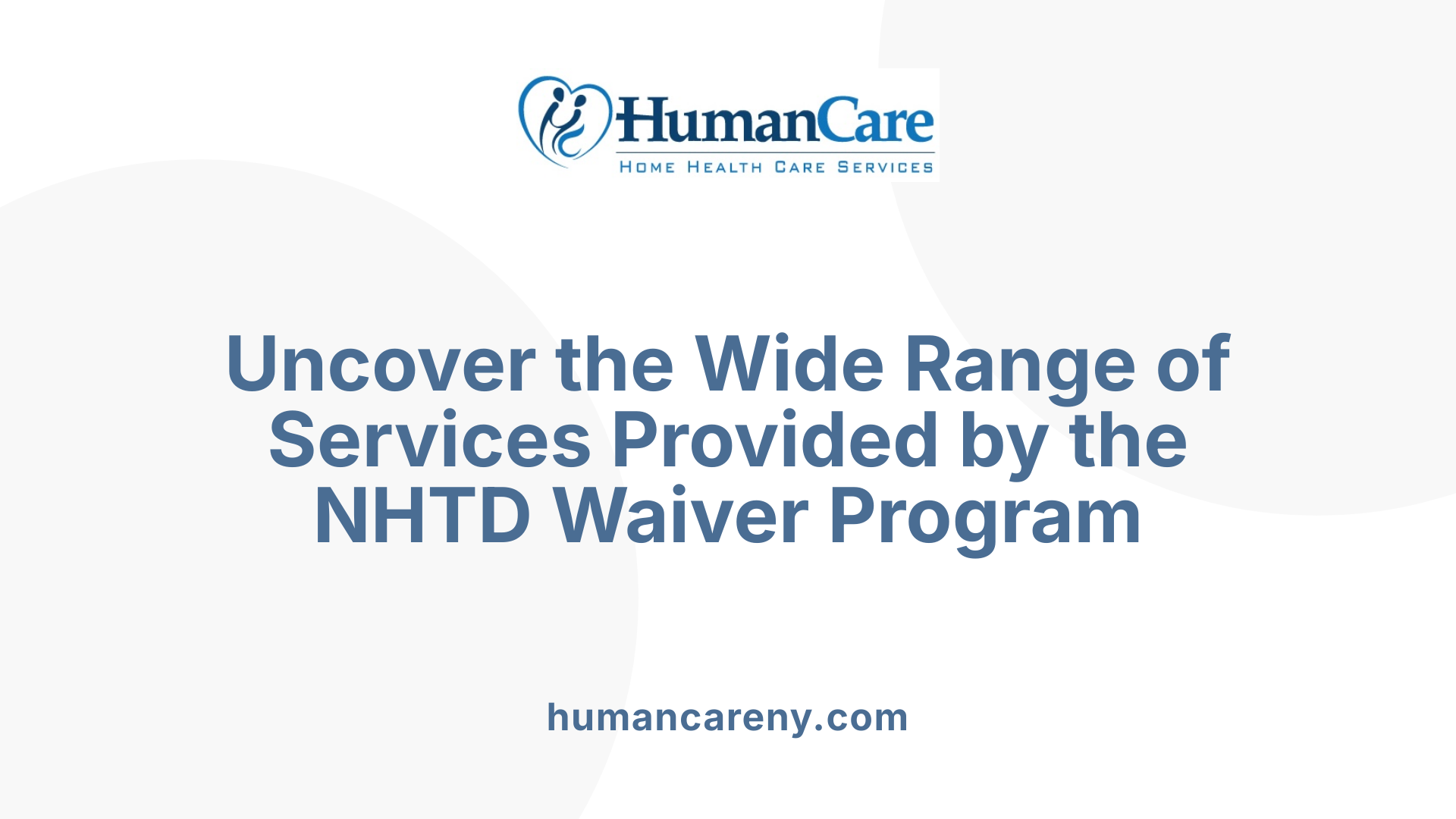
What features and services are offered by the NHTD Waiver Program?
The NHTD Waiver Program provides a wide array of services to support aged or disabled individuals in maintaining independence and community involvement. Its goal is to help participants live safely and comfortably at home or in community settings instead of institutional care.
A core component of the program is service coordination. Care managers work closely with each individual to develop personalized service plans that meet their unique needs and preferences. This includes assessing health conditions, setting goals, and organizing suitable supports.
Assistive technology is another vital service—helping participants use devices such as mobility aids, communication tools, or safety systems that improve their daily functioning. Home modifications like grab bars, ramps, and non-slip mats make navigation safer and reduce fall risks.
Beyond these, the program offers community integration counseling to foster social engagement and prevent isolation. Environmental modifications tailored to individual needs help create accessible living environments.
Participants also receive support through home and community-based services, including assistance with daily tasks like meal preparation and housekeeping. Medical home visits and behavioral supports ensure ongoing health management.
Other services include structured day programs that provide routine, social opportunities; nutritional counseling and meal services to promote health; peer mentoring and wellness counseling for emotional well-being.
For those transitioning into the community, services like moving assistance and housing support are available. Additionally, the program offers education and training in living skills, such as medication management and personal care, to reinforce independence.
In essence, the NHTD Waiver’s broad range of services is designed to address individual needs comprehensively, promoting self-sufficiency, safety, and active community participation.
Legal, policy, and funding framework of NHTD
What is the policy background and structural framework of the NHTD program?
The NHTD (Nursing Home Transition and Diversion) Waiver is established under the authority of Section 1915(c) of the Social Security Act at the federal level. This section allows states to create home and community-based services (HCBS) programs that help individuals avoid or leave institutional care, such as nursing homes. By leveraging this authority, New York State developed the NHTD Waiver to support individuals with disabilities and seniors in living more independently.
Within the larger scope of Medicaid, the NHTD program is part of New York’s broader Medicaid Waiver system. It emphasizes a person-centered approach, ensuring services are tailored to individual needs and preferences. Federal regulations, especially the HCBS Final Rule, guide the program to promote community integration, safeguard rights, and enable personal choice.
The program’s structural design involves seamless coordination among several state agencies and stakeholders. The New York State Department of Health (NYSDOH) is the primary agency overseeing Medicaid waiver initiatives. They collaborate with Regional Resource Development Centers (RRDCs) that coordinate service planning and provider networks. Service coordinators act as the primary point of contact for participants, developing personalized care plans and assisting with service access.
Various qualified providers, including home care agencies, therapists, and environmental modification specialists, deliver service provisions. The program also integrates monitoring and quality assurance mechanisms to maintain standards of care and ensure compliance with federal and state policies.
Policy guidelines define eligibility criteria—such as Medicaid enrollment, age, and care needs—and set operational standards. Service planning involves detailed assessments to determine appropriate service allocations, which uphold the individuals’ rights to autonomy and community participation.
Reporting mechanisms are in place for incident management, quality audits, and continuous improvement efforts. All these elements contribute to a structured system aimed at reducing reliance on institutional settings, promoting community inclusion, and ensuring accountability.
How do policies coordinate among different entities?
The success of the NHTD program heavily depends on effective collaboration among agencies. The NYSDOH provides overarching policy direction, licensing standards, and regulatory oversight. The RRDCs facilitate regional coordination, resource allocation, and provider engagement.
Service coordinators serve as the bridge between participants and providers, ensuring each individual’s needs are met comprehensively. Providers are held to strict qualification standards and participate in ongoing training to maintain quality.
Regular monitoring, evaluations, and audits ensure compliance, with reports submitted to the NYSDOH. This multi-tiered coordination ensures that individuals receive appropriate, high-quality services that respect their rights.
How is quality assurance maintained?
Quality assurance in the NHTD program involves multiple layers, including provider credentialing, regular assessments, and feedback mechanisms. State policies mandate minimum provider standards, including background checks and specific training requirements.
Periodic evaluations and client satisfaction surveys help monitor service performance. Complaint and incident reporting systems enable swift responses to issues, and corrective actions are implemented when necessary.
Additionally, the program aligns with federal requirements such as the HCBS Quality and Oversight measures. Continuous quality improvement initiatives drive service enhancements, ensuring that participants experience safe, respectful, and effective supports.
| Aspect | Description | Responsible Entity |
|---|---|---|
| Policy framework | Federal Section 1915(c), HCBS Final Rule, NY policies | NY State Department of Health |
| Partnership | Coordination among state agencies, providers, RRDCs | NY State Department of Health, Regional Centers |
| Quality standards | Provider qualifications, assessments, incident reporting | NY State Department of Health, Accrediting bodies |
| Participant rights | Person-centered planning, choice, safety | Service coordinators, providers |
| Monitoring & evaluation | Regular audits, feedback systems, incident reviews | NY State Department of Health |
Evidence supporting the effectiveness of NHTD
Is there evidence demonstrating the effectiveness of the NHTD program?
Extensive research and program evaluations affirm that the NHTD Waiver Program effectively supports community living for individuals with disabilities and seniors. Multiple studies show that participants benefit from services designed to delay or prevent nursing home admissions.
Evaluation data reveals that those enrolled in NHTD are less likely to experience prolonged stays in institutional settings. When they do transition into nursing homes, the duration of stay tends to be shorter compared to similar eligible individuals who did not participate. This demonstrates that the program facilitates timely interventions that empower users to remain in familiar environments.
Furthermore, data indicates a higher rate of return to community-based living among NHTD recipients who have experienced institutionalization. This recovery trajectory underscores the program’s impact on fostering independence and supporting aging in place.
In addition to its core focus on disability support, NHTD has played a role in public health initiatives, including increased HIV testing and identification. Activities associated with the program have led to higher testing rates, particularly within high-risk populations, enabling earlier detection and treatment of HIV infections.
Research findings also highlight improvements in participants' health and functional status. For example, evaluations show that many individuals benefit from assistive technology and home modifications that enhance safety and accessibility, reducing the risk of accidents and health deteriorations.
These collective findings underscore the importance of the NHTD program not only in reducing reliance on institutional care but also in promoting overall well-being and community engagement among vulnerable populations.
Impact on nursing home entry and community integration
The program significantly reduces the likelihood of nursing home admissions by providing tailored home and community-based services. Participants often maintain or regain skills needed for everyday activities, supporting their independence and inclusion.
Data demonstrates that individuals involved in NHTD are more likely to age in place, enjoying enhanced social connections and access to community resources. This community integration reduces social isolation and fosters active participation, essential for mental and emotional health.
Public health contributions
Beyond individual benefits, NHTD contributes to broader public health goals. By increasing access to health screenings, preventive care, and education, the program helps control and reduce the spread of communicable diseases like HIV. It facilitates early intervention, which can lead to better health outcomes and reduced healthcare costs.
In summary, evidence confirms that NHTD improves health, supports independence, and promotes community living. Its role in public health and reducing institutionalization has been supported through rigorous evaluations and ongoing research.
| Aspect | Evidence | Additional Notes |
|---|---|---|
| Nursing home reductions | Fewer and shorter stays | Data shows decreased reliance on institutional care |
| Community integration | Increased participation | Enables aging in place and social inclusion |
| Public health impact | Higher HIV testing | Early detection and improved health outcomes |
| Functional improvements | Better ADL performance | Use of assistive technology and modifications |
| Crisis prevention | Reduced hospitalizations | Enhanced safety and health management |
This body of research affirms the invaluable role of NHTD in transforming care for individuals with disabilities and older adults, making it a vital component of Medicaid services in New York.
Facilitating successful transitions and ongoing community support
How does the NHTD program support transitions and ongoing services for seniors and disabled individuals?
The NHTD Waiver Program plays a vital role in helping seniors and individuals with disabilities transition smoothly from institutional care to community living. One of its main focuses is on personalized transition planning. Care managers work closely with each participant to develop tailored strategies that support safe and efficient moves. This planning considers the individual's medical needs, preferences, and housing options.
To ensure that the transition is as seamless as possible, the program provides environmental modifications and move-in assistance. These services can include installing grab bars, ramps, and non-slip mats that enhance safety, as well as helping with搬家-related tasks. Such modifications make it easier and safer for individuals to navigate their new homes, promoting independence from day one.
Once participants are settled into the community, the program continues to offer a comprehensive array of services to maintain stability. Home and community support services include daily living assistance, medical oversight, and social engagement activities.
Assistive technologies are also provided to help participants perform daily tasks more easily, such as medication management tools or communication devices. Regular service coordination is critical here, as care managers monitor health status and adjust service plans as needed.
Ongoing support is further reinforced with respite care options and counseling services that help caregivers and participants manage emotional and physical challenges. This continuous oversight ensures that individuals remain safe, healthy, and engaged in their community.
A person-centered approach underpins all these efforts, giving individuals control over their services and fostering a sense of independence. The program also collaborates with housing agencies and offers support in securing affordable, accessible housing options. Through coordinated efforts and personalized services, the NHTD Waiver Program helps participants stay rooted in their communities, reducing reliance on institutional care.
In summary, the NHTD program supports both the transition into community living and the maintenance of independence with a comprehensive, individualized approach that emphasizes safety, stability, and personal choice.
Conclusion: The future of community-based support for seniors and individuals with disabilities
What is the outlook for the NHTD program and community living supports?
The future of the NHTD (Nursing Home Transition and Diversion) program holds promising developments that aim to further enhance community-based living options for seniors and individuals with disabilities. As healthcare policies evolve, there is a consistent focus on expanding access to services, improving the quality of care, and integrating innovative solutions such as advanced assistive technologies.
Ongoing efforts involve broadening eligibility and service delivery models to reach more individuals in need. Policy reforms are also underway to reinforce the principles of person-centered care, ensuring that services are tailored to individual preferences and needs. This approach promotes self-sufficiency and respects the rights of participants, empowering them to live independently within their communities.
A significant aspect of the program’s future direction is the transition toward managed care models. Initiatives like Managed Long Term Care (MLTC) and Medicaid Managed Care (MMC) are designed to streamline access, improve coordination among providers, and enhance health outcomes. These models aim to create seamless service experiences that support lasting independence.
Additionally, technologies such as remote monitoring, telehealth, and smart home devices are expected to play an increasing role in community support. These advancements can facilitate real-time health management, improve safety, and foster social connectivity.
The program also emphasizes strengthening community engagement and social inclusion. By reducing social isolation and encouraging meaningful participation, future initiatives aim to improve mental and emotional well-being for participants.
Overall, the outlook for NHTD and related community living supports is positive. With continuous improvements, thoughtful policy evolution, and expanded access, these programs will remain vital in promoting autonomy, reducing reliance on institutional care, and enhancing the quality of life for vulnerable populations.
| Area of Focus | Future Direction | Details |
|---|---|---|
| Policy Engagement | Strengthen person-centered planning | Tailor services to individual needs and rights |
| Access Expansion | Broaden eligibility | Reach more eligible individuals with disabilities and seniors |
| Service Delivery | Incorporate innovative technologies | Use telehealth, remote monitoring, smart devices |
| Care Coordination | Integrate managed care models | Improve health outcomes and streamline services |
| Community Engagement | Promote social inclusion | Reduce isolation, increase community participation |
| Sustainability | Ensure program funding and support | Maintain long-term viability of community supports |
This evolving landscape underscores a commitment to maintaining a flexible, inclusive, and effective system of community-based care. As these efforts continue, individuals with disabilities and seniors will enjoy greater independence and a higher quality of life within their communities.
A Continuing Commitment to Community Living and Independence
The NHTD Waiver Program exemplifies a transformative approach that champions the rights, independence, and well-being of seniors and individuals with disabilities. By offering a comprehensive suite of personalized services, supporting smooth transitions, and fostering community engagement, NHTD significantly improves quality of life. Its policy framework, backed by robust evidence of effectiveness, underscores its vital role in shaping a future where community living is valued and accessible. As the program continues to grow and adapt, it remains a vital pillar in the effort to promote dignity, health, and self-reliance among vulnerable populations.
References
- How The NHTD Waiver Program Enhances Independence For ...
- Home-Based Care Program Reduces Disability And Promotes ...
- Simple Ways Home Care Can Improve Quality of Life
- NHTD Medicaid Waiver Program: Holistic Home Care Innovations ...
- NHTD and TBI Waiver Transition Plan
- Nursing Home Transition - Access to Home Care Services
- Nursing Home Transition and Diversion Medicaid Waiver Program
- NHTD and Diversion Medicaid Waiver Program
- Nursing Home Transition/Diversion Waiver (NHTD) - ARISE
- NHTD program in NYC | Angel Care - Home Care agency in New York



